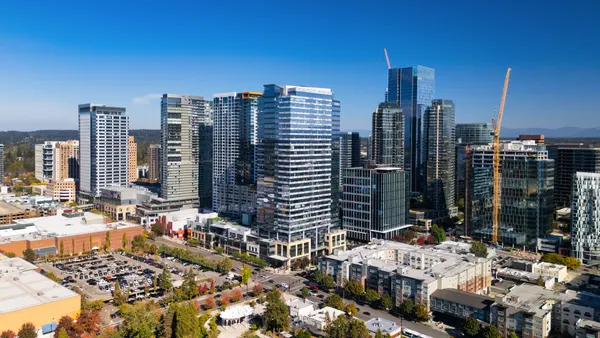Dive Brief:
-
Eighty-two percent of government officials believe their operations should be more technologically advanced, according to a recent survey by Granicus, a company that modernizes government web services and strategies.
-
Sixty-one percent of government officials believe the pandemic has expedited the digitization of their operations, and 52% of citizens said they noticed their local governments are now offering more services online.
-
Citizens and government officials believe the pandemic has changed expectations for how governments should operate. Fifty-four percent of citizens now expect government services to be offered online and 30% of citizens expect those processes to become simpler.
Dive Insight:
Tight budgets, legacy systems and bureaucracy have historically prevented many governments from digitizing. But the pandemic has finally tipped the scale for cities, counties and states to reevaluate their operations, Granicus Chief Product Officer Bob Ainsbury said.
Twenty-eight percent of government officials and 41% of citizens reported that meeting demands for government services and assistance has been the biggest challenge during the pandemic. Those services could include reporting a pothole, filing for unemployment or even acquiring a dog license.
The pandemic has also created a demand for governments to quickly share and reach residents with critical information. Email open and click rates surged at the onset of the coronavirus, according to Granicus. Traffic to local government websites increased 25%.
Many governments have recognized the need to meet the increased demand for information. The City of Minneapolis and the City of Columbus, OH got creative and targeted Gen Z residents via TikTok. Gilbert, AZ turned to video, sharing regular updates on COVID-19 cases or public service announcements.
Other governments, however, have been criticized for a lack of digital information-sharing during the pandemic.
As of April, the City of Omaha, NE used its website homepage as the only form of communication besides the mayor’s Facebook page. About 50 miles south in Lincoln, NE, however, the mayor and city's health directors have taken the reins on information-sharing by posting updates on COVID-19 news in real time via a resource portal that can be translated into several languages.
As residents look to their local governments for more information, city officials could also seize this opportunity to increase and sustain civic engagement, according to Granicus. Thirty percent of government officials believe their organization provides in-person civic engagement opportunities, "indicating significant room for improvement," according to a company statement.
And 44% of citizens and 54% of governments said civic participation would be higher if more of those opportunities were made available online.
The pandemic has also spurred an "infodemic," according to Granicus, due to the spread of misinformation. "Government has an opportunity to replace unreliable sources with proactive, consistent communication with constituents," according to a company statement.
An overwhelming 84% and 87% of governments and citizens believe that identifying accurate information about COVID-19 can be difficult. Ninety-seven percent of government officials said communicating accurate information can help prevent the spread of misinformation about the pandemic, while only 33% of citizens would consider their government as a source for accurate updates and information.
To keep up with all of our coverage on how the new coronavirus is impacting U.S. cities, visit our daily tracker.













